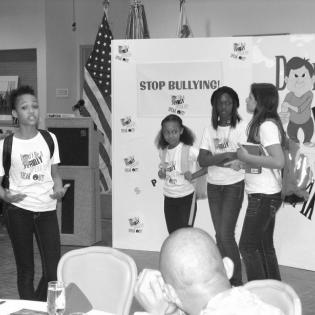Citizen Participation
Young people learn about the variety of ways citizens can become active participants in the community: political parties, interest groups, voting, and providing public service.
The learner will:
- compare and contrast the work of political parties and interest groups.
- describe how citizens can become active participants in their community, working to improve the common good.
Learners talk to their families about ways they participate in civic engagement (nonprofits, volunteering, voting, public policy, running for office). Families can help learners contact local resources to identify community needs.
Instructions
Anticipatory Set:
Ask the learners to brainstorm a list of issues that they are concerned about in the country and community. Have them list ways they can influence decision-makers about these issues.
As an overview, explain that political parties usually take a stance on issues and pursue policies that fit their point of view. Non-politicians can also influence public policy. Citizens can form interest groups, also known as advocates.
Political parties:
- nominate candidates for office and try to win elections to gain control of government decisions.
- are generally broad-based and seek to gain members with many points of view. To be successful, they must be concerned with the problems of most Americans, not just certain groups.
Interest groups:
- influence government officials to support certain policies. They may support candidates who favor their ideas, but they do not nominate candidates for office.
- usually are concerned with only a few issues or specific problems. They do not try to gain members with different points of view.
- are usually organized on the basis of common values rather than from geographic location, although some groups may limit their reach to a specific geographic area or be a local branch of a national group
Give these examples of interest groups: labor unions, business groups, senior citizens’ organizations, religious groups, environmental interest groups, public interest and civil rights groups.
- Ask why an interest group has more influence than one individual who wishes to get an idea across.
- Is it possible for one person to support more than one interest group at a time?
Explain that interest groups get their point across in the following ways:
- lobbying: making contact with lawmakers or other government leaders to try to influence government policy. Persons who represent special interest groups are called lobbyists; they may be paid or citizen volunteers
- media campaigns: using the mass media, including television, newspapers, radio and, increasingly, social media to inform the public and create support for their views.
- legislator contact: interest groups urge their members to write, call and/or social media to government officials to show support for or against a public policy.
Discuss what other ways citizens support their communities.
(vote, assist with campaigns, remain informed on what is going on in the community, volunteer with other citizens to help improve the community)
- Define philanthropy as "giving one’s time, talent or treasure for the sake of another, or for the common good." Other definitions include: voluntary action for the public good, voluntary giving, voluntary service and voluntary association, primarily for the benefit of others.
- Discuss ways that citizens act philanthropically for the community and people in the community.
- Define and ask for examples of the following terms to make sure they are clear in the learners’ minds: service, time, talent, treasure, common good, volunteer. See Definitions (handout).
Optional: Invite individuals from the community to speak about their philanthropic work for the good of the community. Contact a local nonprofit related to an issue the group cares about.
Handouts
Philanthropy Framework
-
Strand PHIL.I Definitions of Philanthropy
-
Standard DP 01. Define Philanthropy
-
Benchmark HS.1 Define philanthropy to include giving and sharing; volunteering; and private individual action intended for the common good. Explain how a volunteer individual/group can act for the common good.
-
-
Standard DP 02. Roles of Government, Business, and Philanthropy
-
Benchmark HS.1 Explain why needs are met in different ways by government, business, civil society and family.
-
-
-
Strand PHIL.II Philanthropy and Civil Society
-
Standard PCS 05. Philanthropy and Government
-
Benchmark HS.9 Explain the role that public interest groups play in public policy formation.
-
-
-
Strand PHIL.IV Volunteering and Service
-
Standard VS 01. Needs Assessment
-
Benchmark HS.1 Identify a need in the school, local community, state, nation, or world.
-
-
